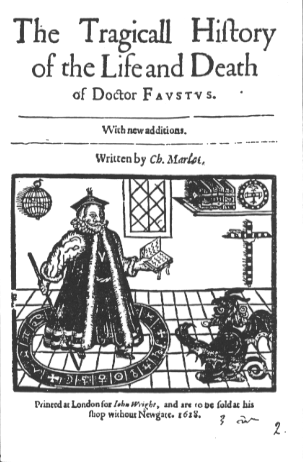Classics Spin Title: Doctor Faustus and Tamburlaine
Hey everyone, I have been in a bit of a blogging slump. I went away for a week, which was a great but exhausting trip to Utah, and then I came back but I just didn't make it to the blog. I need to do some thinking about how my blogging fits into everything else. Anyway!--
It's the day for the Classics Spin Title! I drew a couple of plays by Kit Marlowe; I'd planned to read Doctor Faustus and one other, and I chose the obvious one--Tamburlaine, the play that made Marlowe known while he was still alive.
In Doctor Faustus, a scholar makes a pact with the Devil. Mephistophilis becomes Faustus' servant, bringing him whatever he wants for 24 years, at the end of which he will be dragged down to Hell. This does not seem like a really great deal to me, but throughout the play Faustus ignores his many chances to back out and save himself. A Good Angel and a Bad Angel argue with him, he sees the Seven Deadly Sins in a vision, even Mephistophilis says he hates Hell, but never does Faustus waver until the very end, by which time it's a bit late. The odd thing is that we never see him do much with his magic powers while he is still alive, except to see Helen of Troy.
Tamburlaine the Great was a big deal when it was first acted; it marks the difference between earlier Tudor drama and the great Elizabethan plays. It's a very influential play, but moderns probably won't care for it much; the later Elizabethan drama improved on the new style and the story is not suited to today's tastes.
Tamburlaine starts off as a Scythian shepherd-bandit, but quickly rises to power in the Persian empire. On his way up, he captures an Egyptian princess, Zenocrate, as a concubine, and she falls in love with him. She follows and supports him all the way up to the emperor's throne, and then they attack the Turks and all of Africa. This puts Zenocrates' father in danger of being conquered and killed, and she begs for his life. Tamburlaine agrees to only conquer the Sultan and makes him a vassal king. The play ends with the wedding of Tamburlaine and Zenocrate, and a second play tells the story of their sons and Tamburlaine's death.
It's the day for the Classics Spin Title! I drew a couple of plays by Kit Marlowe; I'd planned to read Doctor Faustus and one other, and I chose the obvious one--Tamburlaine, the play that made Marlowe known while he was still alive.
In Doctor Faustus, a scholar makes a pact with the Devil. Mephistophilis becomes Faustus' servant, bringing him whatever he wants for 24 years, at the end of which he will be dragged down to Hell. This does not seem like a really great deal to me, but throughout the play Faustus ignores his many chances to back out and save himself. A Good Angel and a Bad Angel argue with him, he sees the Seven Deadly Sins in a vision, even Mephistophilis says he hates Hell, but never does Faustus waver until the very end, by which time it's a bit late. The odd thing is that we never see him do much with his magic powers while he is still alive, except to see Helen of Troy.
Tamburlaine the Great was a big deal when it was first acted; it marks the difference between earlier Tudor drama and the great Elizabethan plays. It's a very influential play, but moderns probably won't care for it much; the later Elizabethan drama improved on the new style and the story is not suited to today's tastes.
Tamburlaine starts off as a Scythian shepherd-bandit, but quickly rises to power in the Persian empire. On his way up, he captures an Egyptian princess, Zenocrate, as a concubine, and she falls in love with him. She follows and supports him all the way up to the emperor's throne, and then they attack the Turks and all of Africa. This puts Zenocrates' father in danger of being conquered and killed, and she begs for his life. Tamburlaine agrees to only conquer the Sultan and makes him a vassal king. The play ends with the wedding of Tamburlaine and Zenocrate, and a second play tells the story of their sons and Tamburlaine's death.





Comments
Post a Comment
I'd love to know what you think, so please comment!